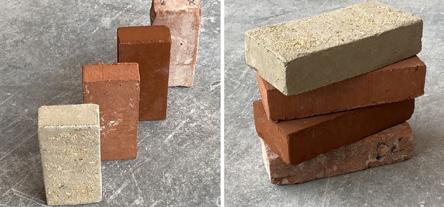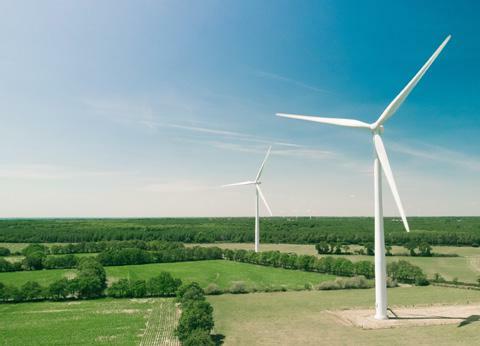
4 minute read
Materials
Bricks made from brick waste
Each year, we generate about 400,000 tonnes of brick waste in Denmark, and only a small portion of this is recycled into new bricks. We are assisting a company called BrickCycling to optimise and perform quality assurance on a new type of brick that is made from crushed brick waste.
The brick reduces the use of non-renewable resources such as clay and sand. At the same time, the production process involves less CO2 emissions since neither cement nor chalk or heating are used in the process.
The goal is to determine the potential of the brick in terms of replacing conventional facade materials.
The partnership with BrickCycling is a preliminary project that is supported by the Danish Environmental Protection Agency. The participants in the project are BrickCycling, RGS Nordic and Danish Technological Institute.
”The assistance and advice that we have received from Danish Technological Institute have
been invaluable. ” - Andreas Schultz Ohrt, Co-owner of BrickCycling
Recycling materials in the metal industry
In the European metal industry, there is a growing demand for raw materials.
Since newly extracted raw materials are limited, there is a growing demand for recycling and upcycling materials and products in the metal industry.
The amount of titanium scrap alone will grow to approximately 100,000 tonnes per year in the next decade. Titanium scrap is a secondary source of raw materials that is not currently being exploited by European industry.
Therefore, Danish Technological Institute is working on developing methods of recycling that allow for more recycled titanium to be used in various industrial technologies such as Powder Bed Fusion, Cladding, Coating, MIM and the traditional metal industry in the VARETIT project.
The project is financed by Eureka Network, and it is a partnership involving Bühler Group, CRMGroup, Granutools, IONICS, Revatech, Euler 3D and Danish Technological Institute.
From destruction to recycling of ethanol
Ethanol is an invaluable solvent for many production companies. At pK Chemicals A/S, which produces ingredients for the pharmaceutical industry, ethanol is used in cleaning processes for the company’s products.
The Institute and pK Chemicals A/S are currently developing a new process that makes it possible to clean and reuse the ethanol directly in the production process. The goal is for the developed solution model to be established on-site at pK Chemicals and to reduce the company’s ethanol purchases by 80 per cent.
The recycling of ethanol has the potential of reducing CO2 emissions by 22,000 tonnes per year in Denmark alone.
The project is supported by MUDP under the Danish Environmental Protection Agency, and it is a partnership between pK Chemicals A/S and Danish Technological Institute.
Moving towards zero waste in the wind turbine industry
Currently, wind turbines are 85-90 per cent recyclable - however, the composite materials in the blades are the greatest obstacle for a fully circular raw materials circuit.
Together with a group of leading companies and knowledge institutions, we have developed a new technology that can fully recycle composite materials - including those used to make wind turbine blades.
In the CETEC project, work is being done to present a complete solution for both the implementation and commercialisation of
”Vestas has already committed itself to a zerowaste wind turbine production by 2040 at the latest, and CETEC will be an important milestone towards reaching that goal as it will potentially solve the problem of disposing of wind turbine blades.”

- Allan Korsgaard Poulsen, Head of Sustainability and Advanced Materials, Vestas Innovation and Concepts
the new recycling technology - and this will be an important step towards having a wind turbine industry that does not produce waste.
The project is headed by Vestas and partly financed by Innovation Fund Denmark. The other project partners are Olin Corporation, Danish Technological Institute and Aarhus University.
The future of take-away packaging
In the fight against disposable plastics, paper packaging may be the future for takeaway and ready-made meals.
Danish Technological Institute has worked together with Re-bag A/S to develop packaging produced by cellulose fibres. This new type of packaging has the potential to replace the traditional plastic packaging, as cellulose fibres are a sustainable biomaterial and a reusable resource. We have optimised the packaging by adding an advanced combination coating so that it is now suitable for storing food and to be part of a circular loop in the paper/cardboard fraction.
The solution is groundbreaking, as paperbased food packaging such as, for example, milk cartons and takeaway boxes are normally laminated with either a thin layer of plastic foil or wax, which makes them unsuitable for being sorted with paper waste.
”The Institute is an important stakeholder for Re-bag, both in terms of developing new materials, as a sparring partner and for finding the production-friendly solutions that are needed to scale things up. ”
- Mette Vinding, CSR Manager at Re-bag








